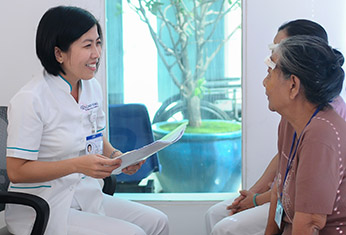Cataract is the most common cause of poor vision in the elderly. It is a curable form of blindness. Do not ignore any emerging symptoms. Have regular check-ups with an eye specialist. Early detection can prevent permanent blindness.
Cao Thang Eye Hospital's Cataract department is designed to give each patient the ultimate experience in same day surgical procedures with unrivaled quality of care. It is fully equipped with state-of-the-art technology to perform a number of ophthalmic procedures. Our well-trained ophthalmologists perform thousands of cataract surgeries each year.

A cataract is a clouding of the lens in the eye that affects vision. Cataracts are common in older people. A cataract can occur in either or both eyes. It cannot spread from one eye to the other.
As we age, some of the proteins in our eyes may clump together and start to cloud a small area of the lens. This is a cataract. Over time, the cataract can grow larger and cloud more of the lens, making it harder to see.
Researchers suspect that there are several causes of cataract, such as smoking and diabetes. Or, it may be that the protein in the lens just changes clumps from the wear and tear it takes over the years.


The most common symptoms of a cataract are:
-Cloudy or blurry vision.
-Colors seeming faded.
-Seeing glare with light sources such as headlights, lamps, or sunlight. A halo may appear around lights.
-Double vision or multiple images in one eye. (This symptom may clear as the cataract gets larger.)
-Frequent prescription changes in your eyeglasses or contact lenses.
These symptoms also can be a sign of other eye problems. If you have any of these symptoms, check with your eye care professional.
Cao Thang Eye Hospital Cataract Surgery Service comprises a team of Phacoemulsification specialists and is headed by Dr. Nguyen My Dung.
Patients’ expectations follow technological progress. It has become a common choice to take advantage of a cataract removal surgery to undergo a refractive correction procedure simultaneously and attain spectacle-free vision. Cao Thang Eye Hospital’s specialists can suggest a broad range of Intraocular Lenses (IOL) models to patients, from basic to premium lenses. Each patient gets a lens customised to perfectly fit their eye. However, patients are informed that other eye pathologies may prevent them from achieving a restored vision.
• Take out contact lenses at least 5 days before the exam in the case of soft lenses and 3 weeks before for rigid lenses.
• DO NOT eat anything (except plain water) prior to the examination.
• Bring with you to the hospital any medications which you are
currently using.
• Please be at the hospital as scheduled
• Arrange to have someone else drive you home or take a taxi after the examination.
• Examination process, which lasts about 2 hours, consists of 2 stages
– Refraction test.
– Intraocular pressure measurement.
– Enlarging your pupil with dilating drop.
– Consulting with the doctor.
– A blood sample will be taken.
– Measuring current pressure, heart disease risks etc via internal and electrocardiogram test.
– Determining the right power of IOL with the A-scan ultrasound machine.
• Stop using anti-coagulants 3-5 days before the surgery (consult your doctor).
• Use anti-inflammatory eye drops (Nevanac) 3 days prior to the surgery.
• Use anti-biotic eye drops (Cravit) 1 day prior to the surgery.
• Space these 2 types of medicine at least 15 minutes apart.
• Have a bath and wash your hair 1 day before surgery.
• Have breakfast and come to the hospital as scheduled.
• Do not wear facial make-up.
• Take all medications as usual.
• Have someone else take you home after surgery.
• Keep the compress from the surgery until the following checkup; the nurse will give you a replacement.
• Wear sun glasses or other eye protection when going out.
• Wear an eye shield during bedtime to prevent accidental touching of the eye.
• Return to the hospital for a checkup 1 day, 1 week, and 1 month after the operation.
• Use medications as directed.
• Space medications at least 15 minutes apart.
• Take care of eye as instructed by doctor.
• Rest on the first day after surgery.
• Maintain eye hygiene, do not rub or squeeze eye.
• Do not allow water in your eye the first 2 weeks after surgery.
• Do not bend your head looking down for too long.
• Do not overexert or lift heavy weights.
• Wear an eye shield or tape your eyepatch as instructed by your ophthalmologist.
• Limitations to TV viewing, computer work (post-operative first week).
• Patient may go for a walk and do light activities indoors.
• Take medications, instill eye drops and undergo follow-up exam as prescribed.
• Eat regular meals but avoid foods causing cough, constipation, and indigestion.
• Avoid allergic foods taken previously.
• Eat a healthy diet as per medical disease (diabetic retinopathy, renal failure etc.).
• It is a common symptom to feel a foreign body sensation, irritation, or tearing after surgery. These symptoms will gradually disappear after at least one week.
• After the stability of vision you will need a new prescription for reading glasses, except with multifocal lenses (1 month).
• If one of these symptoms occurs: eye redness, pain, blurry vision, nausea, lots of coughing or compression of the eye, please call your surgeon immediately or urgently go to hospital for check-up.